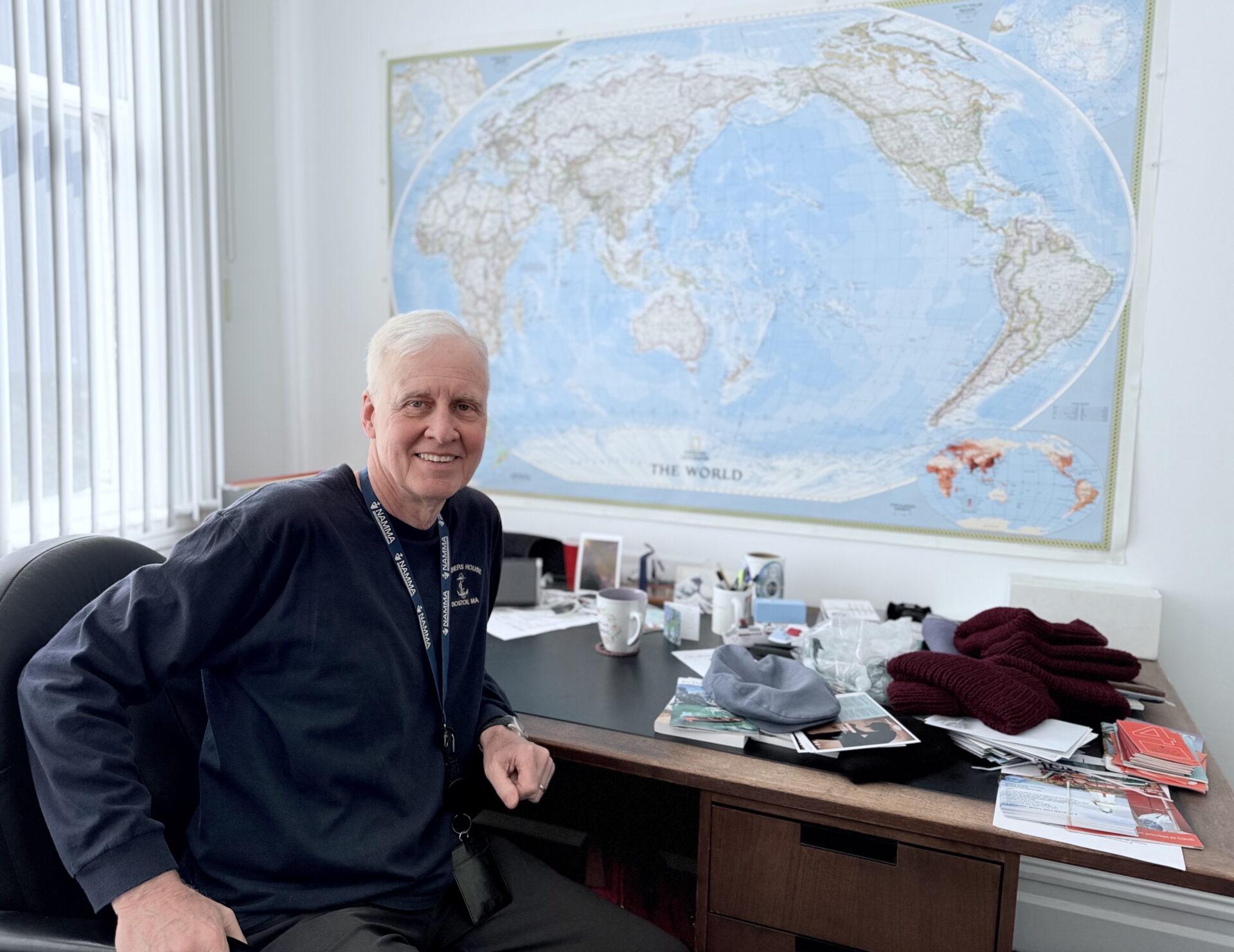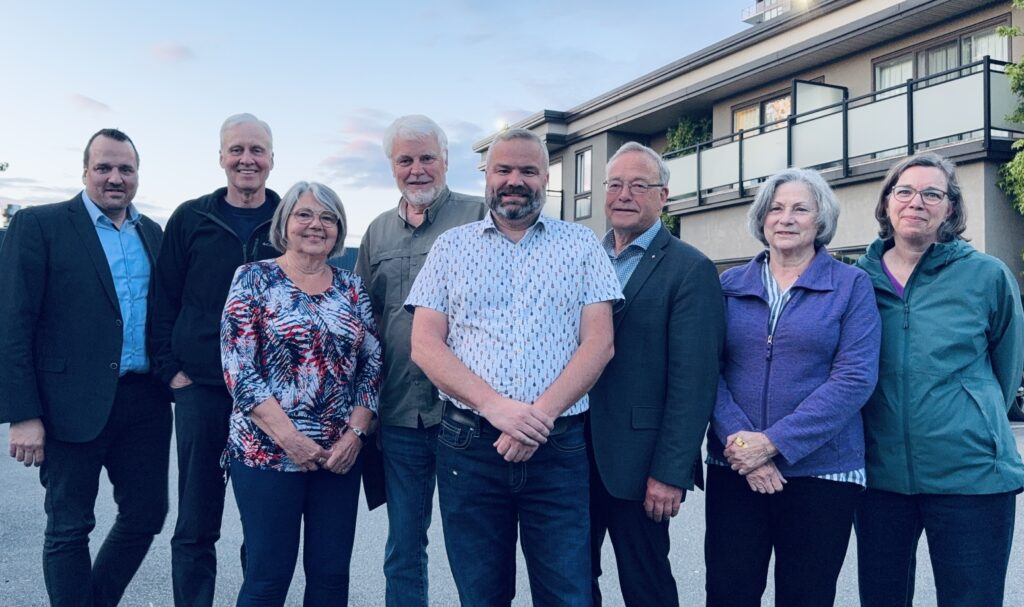In Conversation with Rev Gary Roosma of the Ministry to Seafarers Vancouver

In advance of a NAMMA regional meeting in Vancouver, BC, Dr. Jason Zuidema (Executive Director, NAMMA) met with Rev. Gary Roosma, Chaplain for the Ministry to Seafarers of the Christian Reformed Church. Following their one-on-one conversation, there was also an opportunity to address the full board of M2S Vancouver to discuss the challenges and opportunities facing the future of maritime ministry.
Jason Zuidema We are here with Reverend Gary Roosma, who is of the Ministry to Seafarers of the Christian Reformed Church in Vancouver. Reverend Gary, thank you for this. Can you tell me a little bit about the Ministry to Seafarers?
Gary Roosma Good to be here with you, thanks. Ministry to Seafarers Vancouver is the Christian Reformed Church’s outreach into the port here. We were founded in 1970 officially, full-time, but they had ministry happening before that by individuals and volunteers. The first full-time chaplain was in 1970, and we’ve been involved in the port since then. We joined in a partnership relationship with Mission to Seafarers and the Apostleship of the Sea, or Stella Maris, in 1993 and have been involved ever since.
Jason Zuidema Why is the Church involved in ministry to seafarers? This seems, perhaps at first blush, kind of strange. There are perhaps not missions to truck drivers, or there’s perhaps not missions to hotel workers or other workers—or perhaps even migrant workers. Why seafarers? What is peculiar about seafarers? And, I don’t know, maybe should we have ministries to other categories of workers as well?
Gary Roosma I guess, but I think seafarers are a bit of a unique group, just by virtue of their whole situation. They’re far from home. They are, you know, they’re foreigners living—or just here briefly, visiting. They don’t get a lot of opportunities for spiritual input of any kind, unless they’re somebody who’s very active on board. So, it’s just deemed a group that is pretty needy in terms of their whole setting, and their months away at sea. It started also as a service—it’s also a service organization, or service to the seafarers—so helping them out with rides, and, you know, initially it was phone calls, international phone calls, and now internet service. But yeah, just a chance to help a group of people who can be somewhat marginalized and far from home.
Jason Zuidema For those who don’t necessarily know what chaplaincy is all about—or even chaplaincy to seafarers—what does a chaplain to seafarers do that’s perhaps similar to what a regular minister might do? And in what ways is your work different than what a regular minister might do?
Gary Roosma It’s similar in terms of pastoral care—we’re connecting with people and sort of meeting their needs, trying to encourage them, comfort them, whatever the case may be. So that would be a very similar kind of thing. It’s probably more evangelistic in terms of—there are a lot of people who are also not Christians, who are just looking for connection or just, you know, happy to be served and to have a friend, and to be listened to, and have a listening ear.
It’s different also in that I don’t do regular services in one parish. I do services in lots of churches as part of the ministry and representing the ministry, but I don’t have a regular parish. And I see people—often I may see them once and then never see them again, or I may see them again in a few years, or whatever. Some are more regular—they’re here for a while on a regular schedule and we see them—but then they sign off and then they’re gone. So you don’t have that regularity; you don’t have a regular parish and congregation that you’re serving.
Jason Zuidema How long have you served now with the Ministry to Seafarers?
Gary Roosma Coming up to eight years—over seven and a half years. In September—it’s May now—so in September, I’ll have been here eight years.
Jason Zuidema You are at—I was about to say—you’re at “peak” wisdom! You have some good insight now, after having been around in ministry for a while, and also here in the seafarers’ missions world for a while. What wisdom would you share, if you could, with—I suppose—new chaplains, but I think also just regular ministers, ministers who are serving in congregations and in “regular” congregational settings? What’s the insight that you would have for new ministers about ministry in general? What kind of nuggets of wisdom have you learned in seafarers’ ministry?
Gary Roosma I think I’m still learning, so I still have lots more to learn. I think one of the key things that I’m figuring out more and more is—and I’m the kind of personality that likes to be on a schedule, get my job done, work through things, and keep on that schedule—and I’ve learned not to expect anything schedule-wise.
I’m learning to slow down in terms of going on board and being open to whatever the Lord has in store in that setting, on that ship. And to be open to that. That’s not my typical personality, so I’ve had to learn that. Other people probably would find it easier to go with the flow like that. But anyway, that’s something I’ve had to very much learn to adjust to.
I think there’s lots to learn in terms of learning how to work with people from different faiths—and how do we interact and relate to them as believers, and yet also just really have a caring heart for them. I’m learning to guard my language, my speech—to be less religious, less “Christianese,” and to be a little bit more understanding of the terms that they may not understand at all.
Jason Zuidema Your comment about learning how to slow down is interesting because it actually links to the second one as well. How do you intentionally have a schedule that is flexible? In fact, it takes a lot of work to be flexible, because someone might look at you and say, “Well, he’s just being lazy,” or it looks like something else. To the uninitiated, it looks like you’re just taking it easy and mailing it in and not really doing it. And that seafarers’ ministry can look like that in a certain context—where it looks like you’re just not doing a whole lot of anything.
Gary Roosma And it can feel like that, even.
Jason Zuidema So how do you train the muscles of being relaxed—or being able to easily pivot, being able to adapt to any situation that is thrown at you?
Gary Roosma I’m not sure I’m so good at easily adapting to situations, but I think I just go on board—I have to consciously go on board with a really open mind to whatever. Not necessarily thinking I’m going to get on and off because I’ve got another ship to go visit. Maybe I won’t make it to the next ship, because this ship needs it.
Also, I kind of have to think, “Okay, I need to just be here for a while and take some time.” Now, obviously, there are exceptions. You go on board and there’s a PSC inspection going on, or customs is just on board, and they’re like, “We don’t need you here,” and then it’s, “Okay, I’ll come back later.” So you still have to be open to that kind of thing.
But I think I just have to be very conscious about the fact that maybe I need to just sit here for a while. Even if there’s no one there, or there’s one person there, I’ll just hang out for a little bit and see if someone else shows up. It’s also finding the right time to visit—and I’m still learning. Every ship is different. Every context is different. Sometimes it is hit and miss.
But I just have to be thinking in that mode. Again, it’s not my personality, so I have to be thinking, “Okay, what [can I do here]?” And also taking time to just pray. Simply pray at times and just say, “Okay Lord, do you have someone here for me to meet?” And then seeing who shows up.
Jason Zuidema The ministry, as you mentioned, has been in this official ecumenical relationship for a number of years—unofficially, for many years even before that. It’s interesting to note—and this would be different than perhaps other “regular” ministers and congregations—that you physically work alongside your colleagues on a daily basis from other denominations: from the Anglican and Catholic Churches, but also other various denominations that work in port ministry, in the same space. How does that form your daily work, and how has that been useful for you—even spiritually, I want to say?
Gary Roosma Oh, I think it’s been great. I wouldn’t trade it for anything. I mean, I still rub shoulders with a lot of my Christian Reformed colleagues during meetings, classes, things like that when we get together—but to be able to connect with… I mean, again, my whole life I’ve been in missions, so I worked with other denominations, and I’ve always worked in that kind of a context. So for me, moving into this position was not a big adjustment. But I think it has enriched me in terms of appreciating the richness of other traditions and what they bring, and seeing how they work. And being able to work together—to me, it’s been very, very fulfilling. So I wouldn’t trade it for anything.
Jason Zuidema Thank you very much, Gary, for your time. It’s been wonderful to speak with you.
Gary Roosma Thank you. It’s been good to connect again—and to be able to share. Thanks.
